Planned 2019 Test Flight To Hit Speeds Of 1,688 MPH;
Denver Co-Founders Raise $150 Million For Start-Up Firm
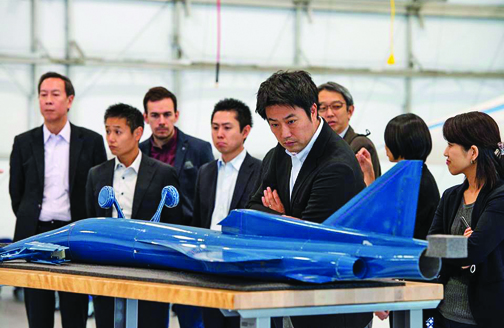
Future Boom Operator: Japan Airlines has invested $10 million in Boom and was given a special tour of the Denver headquarters. The airline has pre-ordered 20 aircraft and got a peek at the XB-1.
The XB-1 aircraft dubbed Baby Boom — a one-third-scale supersonic demonstrator — being built by Denver-based Boom Supersonic plans its first test flight later this year. Designed to reach speeds of up to 1,688 miles per hour or twice the speed of sound, it is the prototype for a commercial 55-passenger plane with a range of 5,180 miles to be introduced by 2023.
Co-founded by Denverites Blake Scholl and Josh Krall in 2014, the firm had raised $151 million by January of this year. Among the startup investors were several venture funds that kicked in $33 million in March 2017. In December 2017 Japan Airlines invested another $10 million, enough to build the XB-1 “Baby Boom.” Then in January Boom Supersonic was given another $100 million by Apple founder Steve Jobs’ widow Laurene Powell Jobs.
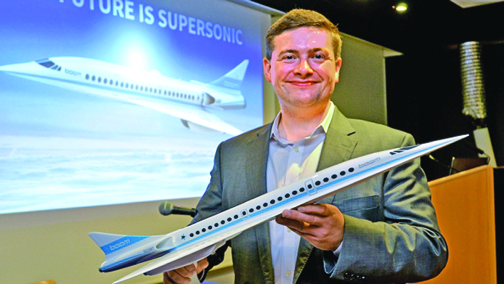
Supersonic Building Boom: Co-founded by Denverites Blake Scholl and Josh Krall in 2014, Boom Supersonic plans a test flight of the XB-1 aircraft dubbed Baby Boom this year.
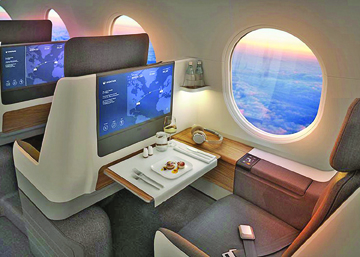
Comfortably Close: The 55-seat plane named the Boom Overture will be able to fly from New York to London, Paris to Montreal, and Madrid to Boston in under four hours or less than half the time of conventional jets.
Boom says its aircraft — with a price estimate of $200 million — will produce a sonic boom at least 30 times quieter than the Concorde, which was also dogged by high operating costs and fuel consumption plus low capacity utilization. Boom estimates that fares for its aircraft will be 75% lower than the Concorde and comparable to current business class tickets, due to better fuel efficiency.
Pre-Orders Booming
Boom has 76 pre-orders for the 55-seat plane. The first commercial airline to back the venture with investments was British airline Virgin Atlantic that has options for 10 of the new aircraft. They made the deal 14 years after the final flight of the Concorde. In addition Japan Airlines has the option to purchase up to 20 Boom aircraft and will assist efforts to hone the aircraft’s design and passenger experience, according to the companies.
Called the Boom Overture, the 55-seat plane will be able to fly from New York to London, Paris to Montreal, and Madrid to Boston in under four hours — less than half the time of conventional jets. Although the plane will have fewer than half the seats of a Concorde, company officials say it will have a much better range — a staggering 5,180 miles.
The supersonic jet will also be more economical, and its sonic boom will be “at least 30 times quieter” than Concorde, the company claims. They also say that when it comes to landing and take-off: “Overture will be as quiet as the subsonic aircraft flying similar routes today.”
Mach 2.2 Speed
The firm says its jetliner — expected to enter service by the mid 2020s — will fly at speeds of Mach 2.2, 10% faster than the British-French joint venture Concorde, which popularized supersonic jet travel in the 1970s.
With 500 viable routes, there could be a market for 1,000 supersonic airliners with business class fares. It expects to keep the delta wing configuration of the Concorde but would be built with composite materials. It would be powered by three dry 15,000 20,000 lbf (67-89 kN) turbofans; a derivative or a clean sheet design will be selected in 2019.
General Electric Co., Honeywell International Inc. and Netherlands-based TenCate Advanced Composites are among suppliers for the Denver firm’s supersonic jets.
Accessible Planet
The Denver-based company was founded for the express purpose of making our planet dramatically more accessible. “We are taking proven science and engineering and using it to build a Mach-2.2 airliner that will kick off the supersonic era. And we are making the company a place where the best people on the planet can be inspired and enabled to do the best and most meaningful work of their careers,” says Founder-CEO Blake Scholl.
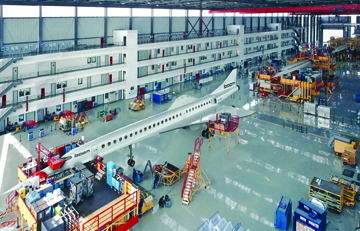
Blake’s Baby: Making high-speed travel mainstream is why Blake Scholl, who lives in Denver and is the father of three, founded Boom Supersonic.
Speed isn’t about going really fast Scholl says, “It’s about closeness. It’s about making far-away places feel like they’re right around the corner.” His point: Some people say that speed makes the world smaller. But at Mach 2.2, the planet is as big as ever. Life is bigger when it is experienced in person — with supersonic speeds, we’ll all experience a bigger world than ever before.
Over long distances people don’t think in miles and kilometers. They think in hours,” the CEO clarifies. He explains it this way: Crossing the U.S. takes about five hours. Going from New York to Dubai takes about 14. Speed isn’t about going really fast. It’s about closeness. It’s about making far away places feel like they’re right around the corner. If we can fly twice as fast, the world becomes twice as small, turning far off lands into familiar neighbors.
Founding Trio
Making high-speed travel mainstream is exactly why Scholl who lives in Denver and is the father of three founded Boom Supersonic. With a BS in Computer Science from Carnegie Mellon, he has held leadership roles at Amazon and Groupon and co-founded mobile technology startup Kima Labs that was acquired by Groupon in 2012.
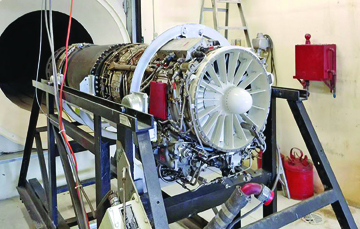
Engineering Change: The first go of Boom Supersonic’s XB-1 engines on a U.S. Air Force Academy test cell ran to 95% of power.
Sitting at the intersection of engineering, design, and marketing, Josh Krall — who also lives here — co-founded Boom with Scholl. He also attended Carnegie Mellon and has an MBA-MPP from Chicago Booth. Co-founder of two startups, his technical work includes owning multidisciplinary design automation software used for conceptual and preliminary aircraft design. He is leading Boom’s efforts to re-imagine the experience of flying and to craft the company’s brand.
Andy Cipra is the third member of the Boom team. He served as head of marketing at Denver’s Dish Network where he created partnerships with Southwest Airlines, Apple and Netflix. Most recently he was Chief Marketing-Commercial Officer for several start-ups in the healthcare and technology space. He holds a Mechanical Engineering degree from Purdue and an MBA from the University of Chicago’s Booth School of Business.
